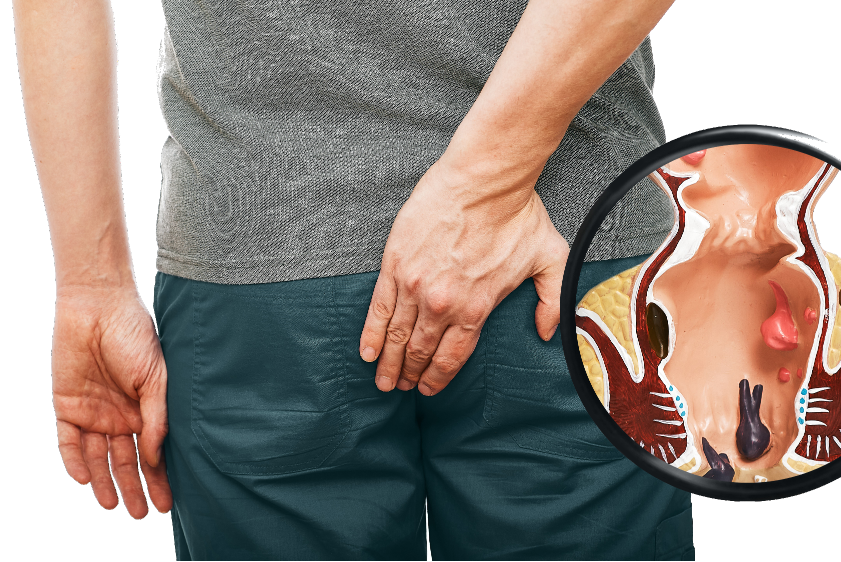*Hassle-free Appointment*
Anal Fistula Treatment in Thrissur From Top Doctors
- No Pain
- Experienced Doctor
- No Cuts or Incisions
- Discharge in 1 day
- Advance Treatment

Book Your Consultation Now
Anal fistula is an anorectal condition in which an abnormal tunnel develops from the lower rectum to the skin. It should be treated on time, or it may lead to various serious complications. You should consult an experienced proctologist in Thrissur and get the best treatment available.
Before delving into the treatment options, let’s first understand what anal fistula is.
An anal fistula is an abnormal pathway between the inside of the anus and the skin outside. It primarily originates from an infected gland near the anus that progresses to the skin. This passageway is filled with blood or pus. Symptoms may include discomfort, inflammation, and the expulsion of blood or pus from the anus. In most instances, surgical intervention is necessary to treat an anal fistula.
Anal fistulas can affect anyone, irrespective of age and gender. According to research, around 26% to 38% of people have anorectal fistulas. An individual can have single or multiple anal fistulas at a time which can cause symptoms that can impact their daily lives.
If you are in Thrissur and looking for the best treatment center for anal fistula, look no further than us. Contact us now to schedule your appointment and undergo a safe and effective laser fistula surgery at an affordable rate in Thrissur.
Best Fistula Doctor in Thrissur

Dr. Sunil Joseph
MBBS, MS, MMIP (Proctology)
16 Years Experience Overall
We are number one clinic in the city for treatment –
Experienced and Expert Doctor
Paper work from admission to discharge in hospital
Treatment with state-of-the-art laser equipment
Free Unlimited Doctor Consultation
Benefits of all types of insurance
Free vehicle facility to go to the doctor for treatment
Worried about the cost of treatment?
Fill the form today and avail
- Treatment facility in installments (No interest - No cost EMI)
- Insurance benefits and paperwork
- Up To 30% Off On Diagnostics

Best Fistula Clinic in Thrissur

Fistula Clinic, Cheranaloor Thykkavu
Bus Stop, 3/515-ATippu Sulthan Road
All Days - 10:00 AM to 8:00 PM

Fistula Clinic, Cochin
VP Marakkar Road Edappally Toll Koonamthai Opposite VanithaVineetha Theatre Ernakulam, Kochi
All Days - 10:00 AM to 8:00 PM
Reviews of treated patients
Bawaseer ki laser surgery se operation ke 3 din baad main acchee tarah se chal paa raha hu aur latrin karne men koi dikkat nahi hoti.
Manoj
Thank you so much, Mera Bahut acche se upchar hua. thanks to doctor for giving such treatment.
Sarthak
Main piles se 2 saal se pareshan tha, thank you to the team, laser surgery ke 2 din baad main sabhi normal kaam kar paa raha hu. Doctor ne poori dekhbhal ki
Aabid
Cause :
- Sitting in one place for a long time
- Chronic Constipation
- Spicy Food
- Less Water
- Drinking Fiber Deficiency
- Injury to the Anal Area
- Rectal Prolapse
Symptom :
- Itching in the Anal Area
- Bleeding during Bowel Movements
- pain in the Anal Region
- Burning in the Anal Area
- Pain on Sitting
Eligibility for laser treatment of Fistula
If the following symptoms are seen in the patient, then the doctor may recommend laser treatment of piles-
- If the Fistula are in the last stage of grade 2
- If the patient has grade 3 piles
- Patient is in early stage of grade 4
Foods to Eat in Anal Fistula
- Brown rice
- Brown bread
- Wheat germ
- Barley
- Bran from wheat
- Oat bran
Foods to Avoid in Anal Fistula
- Refined food
- Added sugar
- Processed food
- Spicy and fried food
Symptoms of Anal Fistula
- Irritation around the anus
- Pain and discomfort while walking, sitting
- Pus or bleeding during bowel movement
- Swelling or redness around the anus
- Discharge from the anus
How do Doctors Diagnose and Treat Anal Fistulas in Thrissur
Diagnosis
Your doctor may suggest some anorectal tests to see the path of your anal fistula. Some common diagnostic tests for anal fistula include:
- MRI (magnetic resonance imaging): An MRI is a test that doesn’t hurt you and gives very clear pictures. This helps doctors see the path of the tunnel and how it affects your muscles and other body parts.
- Endoscopic ultrasound: This is like an MRI, but instead of the machine, a small lighted camera and a small sound wave tool go inside your bottom.
- Fistulography: This is a special X-ray of your tunnel that doctors take after they put dye into it. The dye makes the path of the tunnel show up better.
Treatment for Anal Fistula
Here are some common surgical procedures for anal fistulas:
Fistulotomy
The doctor will first give you a local numbing medicine in the area to be operated. Then, they will make a tiny cut to see the tunnel formed by the fistula. He will then carefully remove any infected tissue from the tunnel. Using a probe, the doctor will check how deep the tunnel is and clean out any junk.
He’ll then clean the area with a special germ-killing solution to stop any infections. After that, the doctor will sew up the inside opening of the fistula. He will then put a clean bandage over the cut to help it heal. In the end, he will give you instructions to care for the wound after the procedure, and might give you medicine for pain if you need it.
LIFT (Ligation of Intersphincteric Fistula Tract)
The doctor first administers anesthesia to numb the treatment area. They then make a cut near the fistula to reach the affected area. Using a special tool, they find the inner opening of the fistula inside the anal passage. The surgeon ties off the part of the fistula close to the muscle in the anal passage, which helps close it. This helps to stop the fistula from forming again. After this, the surgeon closes the cut and the operation is finished.
Seton placement
The doctor gives anesthesia to numb the area for placing the Seton, a small piece of plastic or rubber. After making a small cut, the surgeon puts the Seton through the incision under the skin. The Seton is then carefully tied into a loop, which helps to constantly drain fluids.
Advancement flap procedure
After numbing the area with local anesthesia, the surgeon identifies the fistula tract. A nearby skin flap is carefully cut and moved over the opening of the fistula. Then the surgeon suture the flap to the opening to make it secure to the place.
Laser surgery
In laser surgery for an anal fistula, the patient is first put under anesthesia. A small probe is inserted into the fistula, guided by an endoscope or similar imaging tools. The laser’s energy, sent through the probe, targets and removes the tissue in the fistula. The laser’s heat effectively closes off the fistula.
Why Choose Us for Anal Fistula Treatment in Thrissur?
We are one of the leading surgical treatment providers in Thrissur for anal fistula and make advanced treatment available at affordable rates. We house a team of highly trained and experienced proctologists with more than 10 years of hands-on experience in performing fistula surgeries with the maximum success rate. Our hospitals and clinics are well-equipped with the latest equipment to provide the best in class treatment.
Here are some more reasons why you should choose us to get the anal fistula treatment in Thrissur.
- We have a team of highly trained and experienced proctologists.
- We provide assistance in the insurance claiming process.
- Our treatment procedures are USFDA approved.
- We provide a dedicated care coordinator to each patient to assist them throughout their treatment journey.
- We provide a FREE pick-and-drop facility to our patients on the day of surgery.
- We provide FREE follow-up sessions and a diet plan after the procedure.
- We provide multiple payment options to make the transaction easy during hospitalization.
- We provide personalized and compassionate care round the clock.
If you are in Thrissur and experiencing anal fistula symptoms, schedule your appointment now and get rid of this discomforting condition.
Types of Anal Fistula
- Intersphincteric fistula: Intersphincteric fistula is a type of fistula that develops between the internal and external sphincter muscles. It is characterized by a tract that originates in the rectum or anal canal and extends through the external sphincter muscle.
- Transsphincteric fistula: It is categorized as an abnormal tunnel formed between the internal and external sphincter muscles and crosses external muscles and creates a natural opening.
- Suprasphincteric fistula: It is a complex type of anal fistula that forms between internal sphincter muscles and external sphincter muscles and turns upwards. Surgical intervention is required to treat this condition.
- Extrasphincteric fistula: It is a type of anal fistula that develops at the rectum and extends downside from the external opening.
What are the prevention tips for fistula?
Here are some tips to prevent anal fistula from occurring:
- Maintain good hygiene practices: You should always maintain cleanliness, especially in anal area, which can help prevent anorectal conditions such as anal fistula.
- Address bowel conditions promptly: Conditions like Crohn’s disease or diverticulitis increase the risk of anal fistulas. Therefore, managing such conditions and their symptoms promptly is important.
- Seek timely medical intervention for anal abscesses: An untreated anal abscess can lead to the formation of an anal fistula. You should seek proper medical intervention if you are experiencing pain and discomfort around the anal area.
- Maintain a healthy diet and lifestyle: Eating well and maintaining a healthy lifestyle always keeps you away from diseases. You should exercise and stay hydrated to maintain healthy bowel movements. Eat fiber-rich food that can help avoid constipation and reduce the risk of anal fistulas.
- Avoid straining during bowel movements: Straining due to constipation can lead to intense pressure on the anal canal and lead to various severe conditions like fissures, fistulas and hemorrhoids.
- Get regular checkups: Regular check-ups and access to medical care can ensure early detection and treatment of conditions that could potentially develop into anal fistulas.
What are the benefits of laser fistula surgery?
The benefits of laser fistula surgery are mentioned below:
- Minimally invasive procedure: Anal fistula laser surgery is a minimally invasive procedure that involves small or no cuts. Laser anal fistula surgery can be performed as an outpatient procedure.
- Reduced post-operative pain and discomfort: As this procedure is less invasive, this typically results in less post-operative pain and discomfort.
- Faster recovery time compared to traditional surgery: Laser anal fistula surgery causes less trauma to the body and allows the body to heal fast as compared to other traditional procedures.
- Lower risk of infection: In laser anal fistula surgery, small incisions are made, which make the body less contagious to the infection, and thereby, reduces the risk of postoperative complications.
- Precise and targeted treatment: Laser anal fistula surgery is the latest technology that allows great precision and control during the treatment, which leads to less or no damage to the surrounding tissues.
- Minimal scarring: Minimal scarring is a significant advantage of anal fistula surgery. This surgical procedure aims to minimize the visibility of scars, ensuring favorable outcomes for most patients.
- The improved success rate in closing fistulas: The improved success rate in closing fistulas is a significant benefit of anal fistula surgery. This surgical procedure has been shown to effectively address and close fistulas, leading to improved patient outcomes.
- Reduced recurrence rate of fistulas: Anal fistula surgery offers the benefit of a reduced recurrence rate of fistulas. By surgically treating the fistula, the chances of it recurring are minimized, providing long-term relief for patients.
- Improved quality of life for patients: Anal fistula surgery offers improved quality of life for patients by providing relief from pain and discomfort, allowing them to resume their daily activities with greater ease and comfort.
- Increased patient satisfaction with the outcome of the surgery: Increased patient satisfaction with the outcome of anal fistula surgery is attributed to improved quality of life and reduced pain, leading to a positive surgical experience and overall better patient outcomes.
How to get prepared before undergoing anal fistula surgery?
Before undergoing the procedure, you should understand how to get prepared for the surgery. Some common preparation tips are mentioned below:
- Inform your doctor about past or current medical history. Your doctor must be aware if you are taking any medicines or had any surgery in the past.
- If you have any kind of allergy, your doctor must know about it.
- Take the medicines prescribed by your doctor before the surgery.
- Have a proper conversation with your doctor and get all your queries answered before undergoing surgery.
- Ask your doctor about the benefits, risks, and complications associated with the procedure.
- Don’t eat heavy meals or drink from the night before the surgery to avoid the risk of anesthesia.
- Quit smoking or alcohol drinking at least 1-2 weeks before the surgery.
- Take your insurance papers along with you to get coverage during hospitalization billing.
- Have someone to be with you for at least 24 hours after the surgery.
- Wear loose clothes on the day of the surgery.
How to find the best doctor for anal fistula treatment in Thrissur?
Here are some factors you should keep in mind while choosing the best doctor for anal fistula in Thrissur.
- Seek recommendations: Start by asking your primary care doctor for recommendations. They may be able to suggest specialists who have experience in treating anal fistulas. Additionally, reach out to friends, family, or colleagues who may have undergone similar treatment and ask for their recommendations.
- Research credentials: Once you have a list of potential doctors, research their credentials. Look for doctors who are board-certified in colorectal surgery or proctology available in Thrissur. Board certification ensures that the doctor has undergone rigorous training and has met the necessary standards of expertise.
- Check experience: It’s essential to find a doctor who has experience in treating anal fistulas. Look for doctors who have treated a significant number of patients with this condition. Experience can play a crucial role in ensuring that you receive the best possible care.
- Consider specialized clinics: Some clinics specialize in colorectal surgery or proctology. These clinics may have doctors who specialize specifically in treating anal fistulas. Consider seeking treatment at such specialized clinics as they may provide a higher level of expertise and specialized care.
- Read patient reviews: Online platforms and healthcare review websites can help you check the experience of other patients. Read reviews and testimonials about the doctors you are considering. Pay attention to feedback regarding their expertise, bedside manner, and overall patient satisfaction.
- Consult multiple doctors: Before making a final decision, consider consulting multiple doctors. Schedule initial consultations to discuss your condition, treatment options, and the doctor’s approach. This will allow you to gauge their expertise, communication style, and compatibility with your needs.
- Trust your instincts: Ultimately, it’s important to trust your instincts when choosing a doctor for anal fistula treatment. Consider factors such as the doctor’s communication style, their ability to answer your questions, and your overall comfort level with them.
What is the recovery timeline after laser surgery for an anal fistula?
Here’s a week to week recovery timeline after laser surgery for an anal fistula:
Week 1:
During the first week after laser surgery for an anal fistula, patients can expect to experience some discomfort and pain in the treated area. It is common to have swelling and bruising as well. It is important to follow the post-operative instructions provided by the surgeon, which may include taking pain medication and applying ice packs to the area to reduce swelling. Patients should also avoid any strenuous activities and refrain from sitting for long periods of time.
Week 2:
By the second week, most patients will start to notice a significant improvement in their symptoms. The pain and discomfort will gradually subside, and the swelling and bruising will begin to diminish. It is still important to follow the surgeon’s instructions regarding medication and activity restrictions. Patients may be advised to continue using ice packs and taking pain medication as needed.
Week 3:
During the third week, patients can expect to see further improvement in their recovery. The pain and swelling should continue to decrease, and the treated area should start to heal. It is important to maintain good hygiene in the anal area, following any specific instructions provided by the surgeon. Patients may be advised to use topical medications or ointments to promote healing.
Week 4:
By the fourth week, most patients will have experienced significant improvement in their symptoms and overall recovery. The pain should be minimal or completely gone, and the swelling should also subside. The treated area will continue to heal, and patients may be able to resume normal activities and sit for longer periods of time. Regular follow-up appointments with the surgeon may be required to monitor progress.
Week 5 and beyond:
After the fourth week, the recovery from laser surgery for an anal fistula will continue, but at a slower pace. The treated area will gradually heal completely, and patients should experience minimal to no pain or discomfort. It is important to continue following any post-operative instructions provided by the surgeon, such as maintaining good hygiene and avoiding activities that may put a strain on the healing area.
Recovery Tips After Anal Fistula Surgery
Here are some tips you should follow to recover fast and safely.
- Eat a balanced and healthy diet. Include fresh fruits and vegetables in your diet to prevent constipation. You should avoid processed food, spicy and fatty food as they can increase the risk of constipation.
- Avoid indulging any sexual activity for up to 2-3 weeks after the surgery.
- Avoid heavy weight lifting and strenuous activities immediately after the surgery.
- Take all the medicines on time as prescribed by the doctor.
- Do not pause or start any other medicine on your own without the consultation of your doctor.
- Take a sitz bath twice or thrice in a day after the procedure.
- Wash the anal area properly with water and mild soap. Don’t use harsh chemical based soaps to clean the anal area.
- Drink plenty of water to stay hydrated and maintain a healthy digestive system.
Frequently Asked Questions
What is the first-line treatment for anal fistula?
The first-line treatment for anal fistula typically consists of a procedure called fistulotomy. This surgical intervention involves creating an incision along the fistula tract to promote drainage and allow the healing process. A fistulotomy is considered the most effective treatment option for anal fistulas.
Can anal fistula be treated with medicines?
Symptoms associated with anal fistula can be alleviated by medicines but surgical intervention is the best way to get rid of anal fistula.
What are the risk factors of an anal fistula?
The risk factors of an an anal fistula include conditions such as:
- Crohn’s disease
- Inflammatory bowel disease
- Anal abscesses
Which doctor to consult for anal fistula treatment in Thrissur?
You should consult an experienced proctologist as they are specialized in diagnosing and treating anorectal diseases.
Book an Appointment

